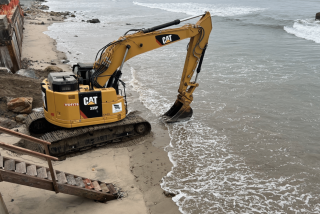Is Lake for Homeowners Only, or Everyone?
- Share via
Mark Bolanos dropped a fishing line into Canyon Lake in August hoping to hook a sunfish, maybe even a bass.
But after fishing in the south Riverside County reservoir for half an hour, the angler found himself caught in someone else’s net.
Private security guards hired by the lakeside homeowners told Bolanos, 39, of Los Angeles that he had trespassed on a private lake. When sheriff’s deputies arrived and threatened to arrest him, Bolanos left.
Now he’s suing the homeowners association that hired the guards and the local water district that owns the lake, saying the reservoir is a publicly owned waterway that should be open for everyone’s enjoyment. Bolanos’ attorney likened his client’s experience to that of beachgoers at Carbon Beach in Malibu who were shooed off public sand by private security guards on ATVs.
“They’ve bullied everyone into thinking the lake is private so that they could keep people off,” said Mark B. Simpkins, Bolanos’ lawyer. “You say something long enough, and people start to believe you.”
To hear Canyon Lake residents tell it, they pay the water district good money for their private lake -- about $900,000 a year. The gated community of 10,000 has a lease with the Elsinore Valley Municipal Water District that gives it exclusive recreational rights to the reservoir, which covers 383 acres, said John E. Brown, a lawyer representing the water district.
Brown called the lawsuit part of a shakedown led by a disgruntled Canyon Lake resident who is Bolanos’ acquaintance. That resident has filed suit against the homeowners association challenging its prohibition against motorcycles on community streets. Simpkins is also his attorney.
“I don’t know where you would stop if you took this plaintiff’s approach,” said Peter E. Racobs, lawyer for the Canyon Lake Property Owners Assn. “His argument seems to be that if you can float a raft on it, you can go there. Taken to the extreme, it would seem to include people’s swimming pools.”
Lawsuit aside, one thing that seems clear is that the line between public and private lakes is often murky at best.
Southern California is home to many popular bodies of water, including Lake Arrowhead, Lake Elsinore and Big Bear Lake. Parts of the shoreline around Lake Elsinore and Big Bear Lake are public, allowing access to the water. But the land around Lake Arrowhead is private. Boaters can’t launch their craft unless they own lakeside property.
“We own the entire shoreline,” said John Rutledge, general manager of the Arrowhead Lake Assn. “If this lake were to dry up, we own the bottom.”
Similarly, swimmers can’t dip their toes into Toluca Lake in Los Angeles or Lake Mission Viejo in Orange County unless they’re invited by dues-paying lake association members.
No one owns the water itself. But unless the public can reach the water without crossing private property, they can’t recreate on it.
“It’s not a question of does the public have the right to use it; it’s does the public have the ability to get there without trespassing,” said Curtis Fossum, senior staff counsel with the State Lands Commission. “If you can get to the water without trespassing, then you have the right to exercise your navigational rights in California.”
On any given day on Canyon Lake, water-skiers trail small motorboats while other craft tool around with sails unfurled.
Not all the land around the lake’s 14 miles of shoreline is lined with homes. Part of the lake’s northern shore includes hills owned by the federal Bureau of Land Management. Bolanos drove over that land to get to the lake.
Simpkins, his lawyer, says Bolanos is in the right both because he didn’t trespass to reach the water and because everyone has the right to enjoy it.
Bolanos, who works for the city of Los Angeles, said he’d heard about the place from friends who live in the area and assumed he’d be able to launch his inflatable boat there if he could get to the water via public land. He said he was confused when Canyon Lake security guards told him he was trespassing.
“From what I’d read, from groups that do water rafting, all waters in California are supposed to be free to float on,” he said.
“I didn’t understand what made this place the exception.”
*
More to Read
Sign up for Essential California
The most important California stories and recommendations in your inbox every morning.
You may occasionally receive promotional content from the Los Angeles Times.













